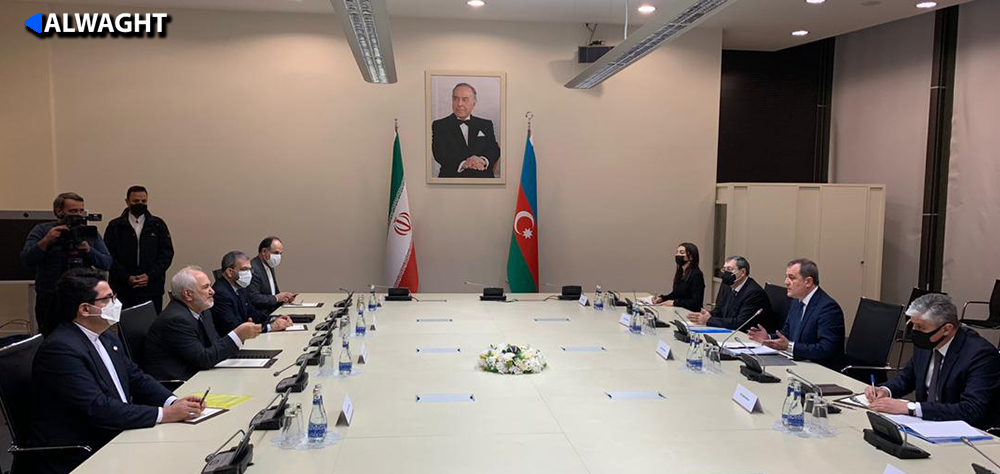Alwaght- Iran’s Foreign Minister Mohammad Javad Zarif arrived in Baku on Monday as first leg of regional tour to Caucasus that will take him to Russia, Armenia, Georgia, and Turkey as well. Zarif's visit comes as Caucasus recently has gone through a heavy war that brought about significant geopolitical changes.
Establishing regional stability and security
Although trip of the head of the Iranian diplomacy to these countries is aimed at strengthening cooperation at various levels, the main goal, or better to say, the leading motivation for his trip is related to Tehran's strategic vision for entrenching peace and stability in Caucasus. In fact, all of the countries included in the trip plan are related to the Nagorno-Karabakh crisis, or are somehow involved and interested in this crisis.
"I intend to travel to countries that can get involved in cooperation to help the Nagorno-Karabakh crisis and the peace and stability in the region," Zarif said in an interview before flying to Azerbaijan.
In recent months, the Karabakh war between Armenia and Azerbaijan has become a hot spot in Caucasus, and even despite the agreement reached between Baku and Yerevan on ceasefire and peace under Russian supervision on November 10, 2020, the crisis is not over yet in the eyes of all actors and the situation remains combustible. Meanwhile, the Islamic Republic that share borders with the disputed region and has security and economic and political considerations and interests, is sensitively following the post-war developments.
In particular, Tehran’s security sensitivities have doubled following reports of the presence of Syrian terrorist groups in Karabakh conflict. In the middle of such worrisome circumstances, Zarif's tour is made on a large scale to eliminate terrorism threat and create comprehensive stability in the region.
Boost for bilateral ties
In addition to advancing security in the region, Zarif intends to discuss bilateral ties with Baku, Moscow, Yerevan, Tbilisi, and Ankara.
One of his most important visits to the region is his visit to Moscow to meet with his Russian counterpart Sergei Lavrov and other Russian officials. Iran and Russia have had a significant level of cooperation over the past few years at various levels, especially when it comes to Syrian crisis and the Astana peace initiative meetings. In the new situation, especially after the Joe Biden government took office as the new president of the US, such issues as the anti-Iranian sanctions relief, as well as boost of security and economic and military cooperation, will be on the agenda of the talks between the Iranian and Russian officials. At another level, after the visit of the Saudi Foreign Minister Faisal bin Farhan Al Saud to Moscow last week, Russian officials welcomed possible dialogue between Tehran and Riyadh. So, this issue could be another topic of discussion for Zarif and the Russians.
In addition to Moscow, the Iranian FM’s visit to Turkey is of great importance. Over the past year, coronavirus outbreak rocked the level of economic cooperation between Tehran and Ankara hard, making it drop considerably. Zarif meeting with his Turkish counterpart Mevlut Cavusoglu can help create new grounds for re-bolstered business ties. Moreover, Tehran and Ankara, as two influential regional powers in regional equations on issues such as the Syrian crisis, Karabakh crisis, and the order and security in the West Asian region, need cooperation and dialogue which would be likely discussed during Ankara trip.
Also, in his visit to Armenia and Azerbaijan, the top Iranian diplomat will present Tehran's definite positions on the Karabakh crisis to both countries. At another level, Iran also wants to bolster business ties with Azerbaijan and Armenia. In the current situation, the trade volume between Tehran and Baku is less than the existing capacities and friendly political relations between the two countries.
In the new conditions, construction of railway terminal, freight terminal, completion of Astara customs and freight terminal are considered as infrastructure programs for the development of cooperation with Azerbaijan. Therefore, Zarif will very likely discuss cooperation boost with Baku.
Also, the trade volume between Tehran and Yerevan, said the Iranian minister of economy, has grown significantly at the beginning of 2021 and is expected to increase to about $1 billion in the next six months. Planning for this business level can be considered in the trip.
Georgia is another Zarif’s tour station. Although Tbilisi is not at the heart of the developments in the Caucasus and Karabakh, Tehran's coordination with it can contribute to establishing stability in the region. Trade data suggest that the trade between Georgia and Iran in 2019 grew 3 percent compared to the year before and reached $258.3 million. This level shrunk slightly in 2020 as the COVID-19 struck. Therefore, in Tbilisi increasing the level of trade and cultural cooperation between the two sides will be one of the significant topics of negotiations.



























